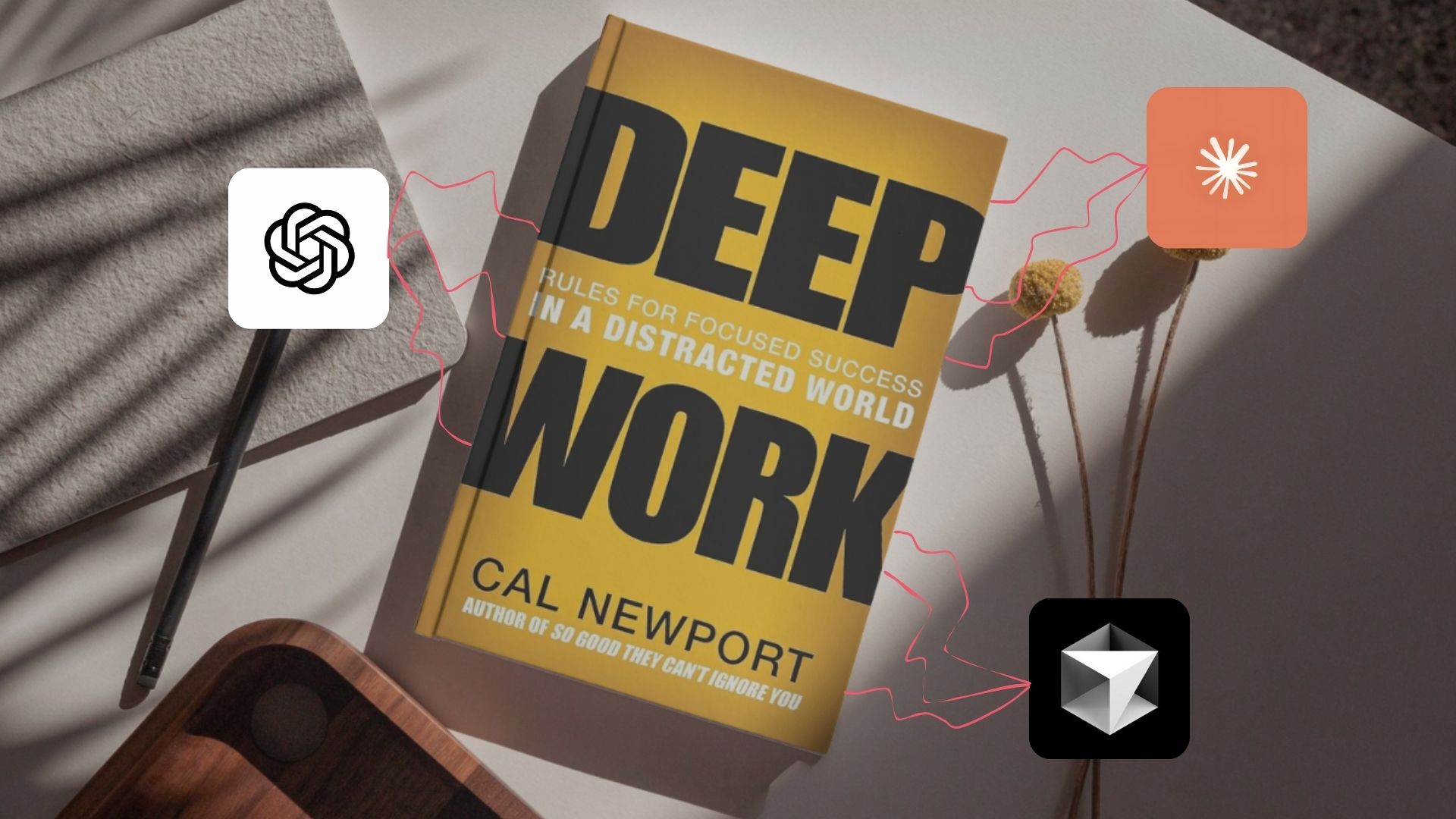AI is Your Sign to Take “Deep Work” Seriously
Sep 26, 2024
·
Nathan Covey
I just finished reading Deep Work by Cal Newport for the first time.
The book has become steadily more relevant (and popular) every year since it was first published in 2016.
Until AI that is, which has 100x'd its relevance.
Here is my prediction:
Unless you learn to do deep work well, your job will be replaced by AI within the next 10 years.
Before I dive into why I believe this, let's do a quick review of the book.
What is Deep Work?
Do you ever feel like you’re “in the zone” while working?
Cal Newport defines this phenomenon as “Deep Work”:
Deep Work = Professional activities performed in a state of distraction-free concentration that push your cognitive capabilities to their limit. These efforts create new value, improve your skill, and are hard to replicate.
Some examples of deep work include:
Writing a research paper
Coding a complex software feature
Designing a strategic business plan
Note that it should push your “cognitive capabilities to their limit.” So just because you're distraction-free while you work doesn’t mean you’re doing deep work. It needs to be an activity that truly stretches your brain.
Understanding the opposite of deep work can be helpful too.
Shallow Work = Noncognitively demanding, logistical-style tasks, often performed while distracted. These efforts tend to not create much new value in the world and are easy to replicate.
Examples of shallow work:
Answering emails
Attending casual meetings
Data entry tasks
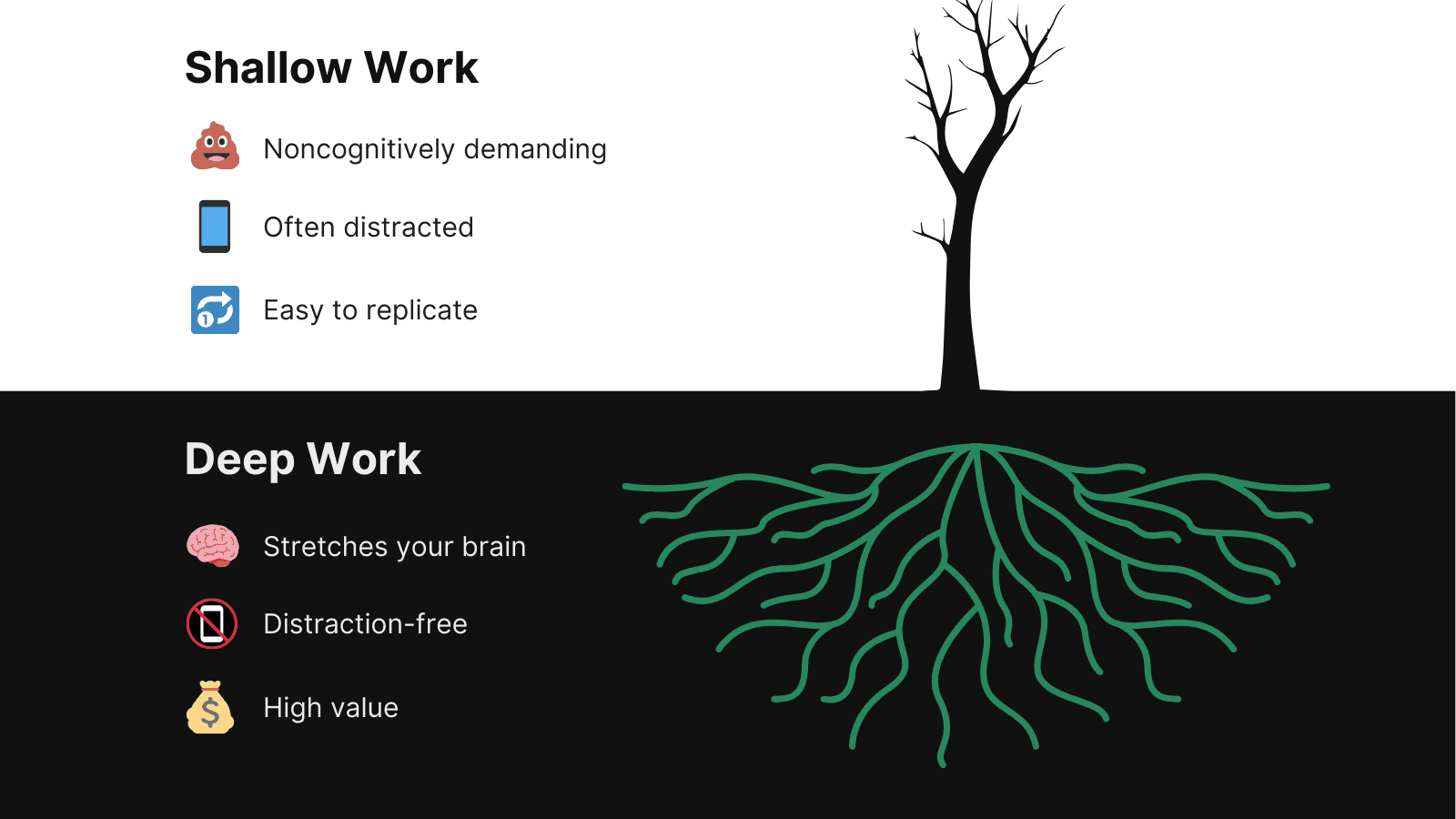
Newport’s hypothesis is that our ability to perform deep work is decreasing while at the same time the demand for it is increasing. As a result, he argues that:
“The few who cultivate this skill, and then make it the core of their working life, will thrive.”
Newport then suggests four rules for cultivating deep work:
Work Deeply - make deep work a “ritual” in your life.
Embrace Boredom - you get the idea.
Quit Social Media - seriously consider the trade-offs of social media use. For many professions, it is a net negative to use social media.
Drain the Shallows - get rid of shallow work to reduce your total working hours, while still making great contributions.
If you want to go deeper (pun intended) you should read the book, but for the purposes of this post let's shift our focus:
AI is taking over shallow work.
It’s now deep work or bust.
Shallow Workers Are the First to Be Replaced
AI is already getting really good at shallow tasks.
For example, I use it to write product descriptions for my e-commerce shop, take notes while I attend meetings, code prototypes for my startup ideas, and create visuals for my social media posts.
It’s hard to quantify if it’s truly “replacing” jobs yet, but as a founder myself, I can say that I literally have not had to hire additional marketing help because of all the work it can do.
And I don’t think I’m the only one.
New research from economists at the Federal Reserve Bank of St. Louis just came out last week, and the results are fascinating:
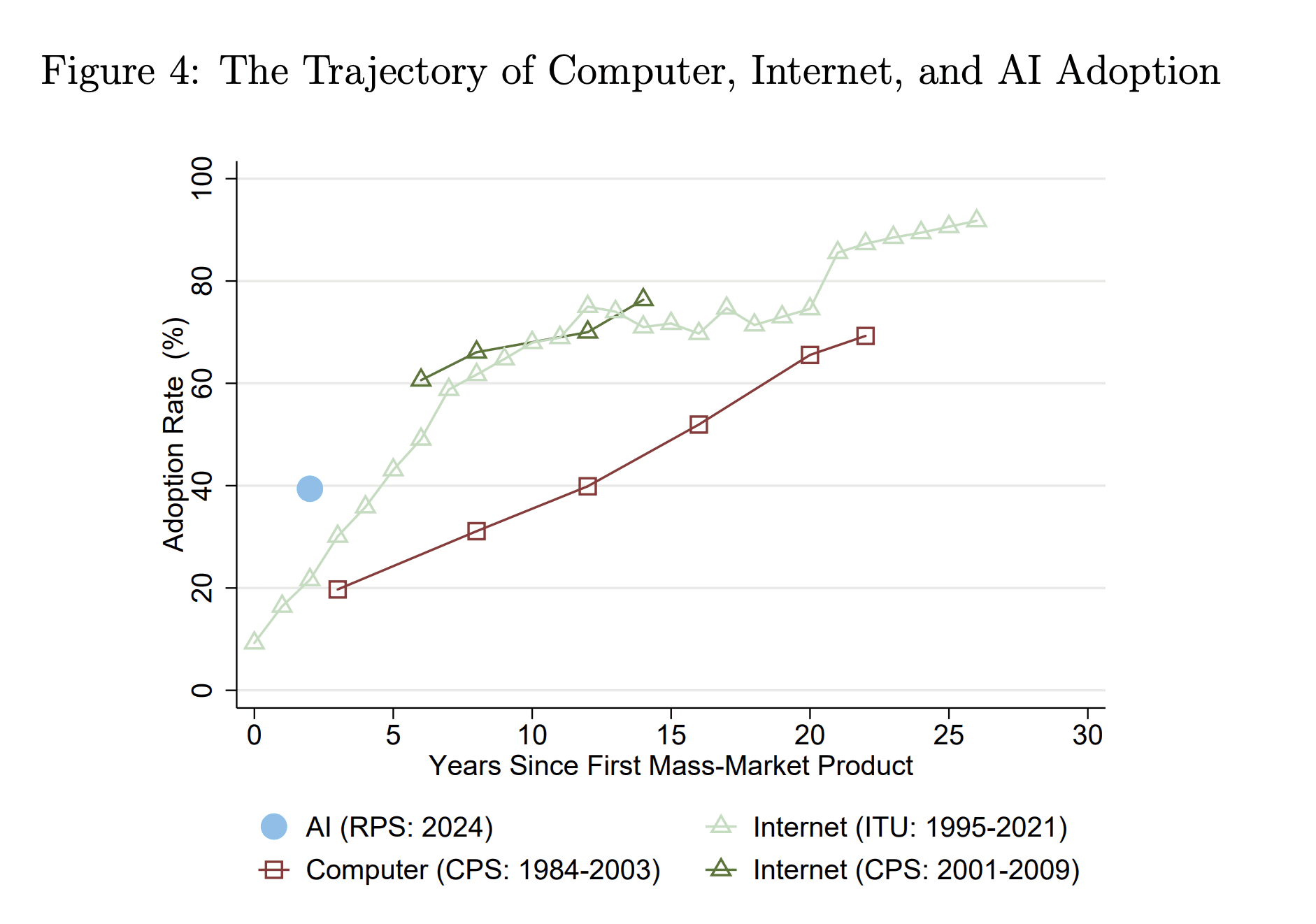
AI is being adopted faster than the computer and the internet. And it’s being used for a variety of tasks and in pretty much every industry:
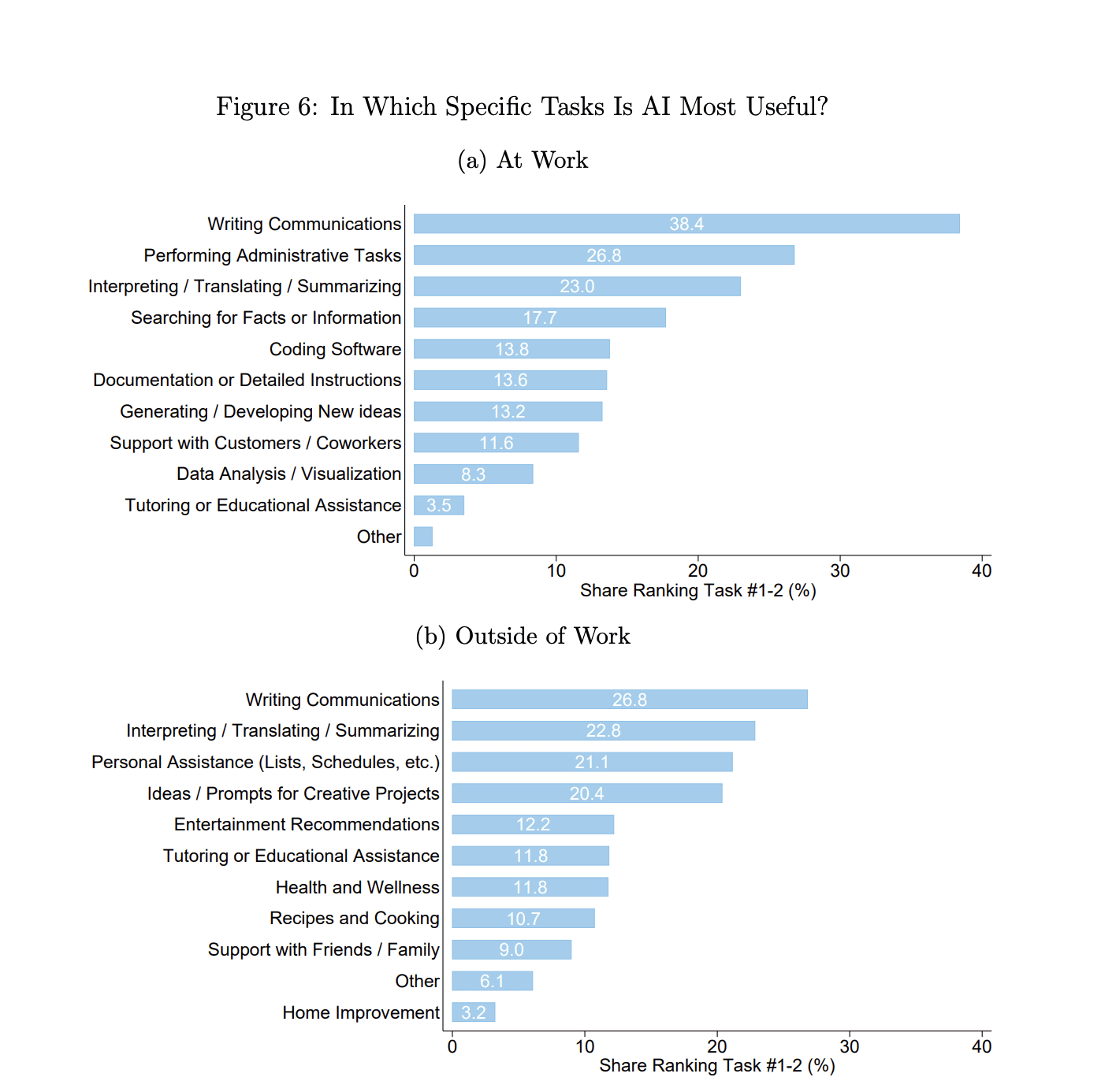
You’ll notice most of these tasks—administrative tasks, searching for facts/information, personal assistance—are what we would consider shallow work. However, we do see some activities that could be seen as deep work too, such as writing, coding software, or data analysis.
Here’s the thing though:
AI is already pretty good at shallow work. Deep work is where it struggles.
If you are a serious person in a "deep work profession," it is obvious that AI will not touch your job anytime soon. AI can write, yes, but its writing is not even close to as good as someone who does it for a living. It can code simple apps, but unless you also know how to code and call out its blatant mistakes it won’t get you very far.
When AI is used for deep work tasks, it is typically only as good as the person using it. That means if you do know how to use AI, and you’re already great at your job, it can actually make you better.
Cal Newport mentions this in the book:
“In this new economy, three groups will have a particular advantage: those who can work well and creatively with intelligent machines, those who are the best at what they do, and those with access to capital.”
I’m not saying AI will never be able to do deep work well, but the deeper the work you do, the harder it will be for AI to replace you.
Implications for Programmers
What does this mean for software engineers?
Deep work is very embedded in effective programming. This is probably why Cal Newport, a computer scientist himself, feels so strongly about it. To be a great programmer, you have to be great at deep work. It’s that simple.
This is good news. If you are constantly learning and adapting, and cultivate the skill of deep work, you could actually be better off with AI than you were before.
However, if you don’t put in this work and remain an average developer, your days may be numbered.
These posts from Ryan Peterman, an engineer at Instagram, highlight this well:
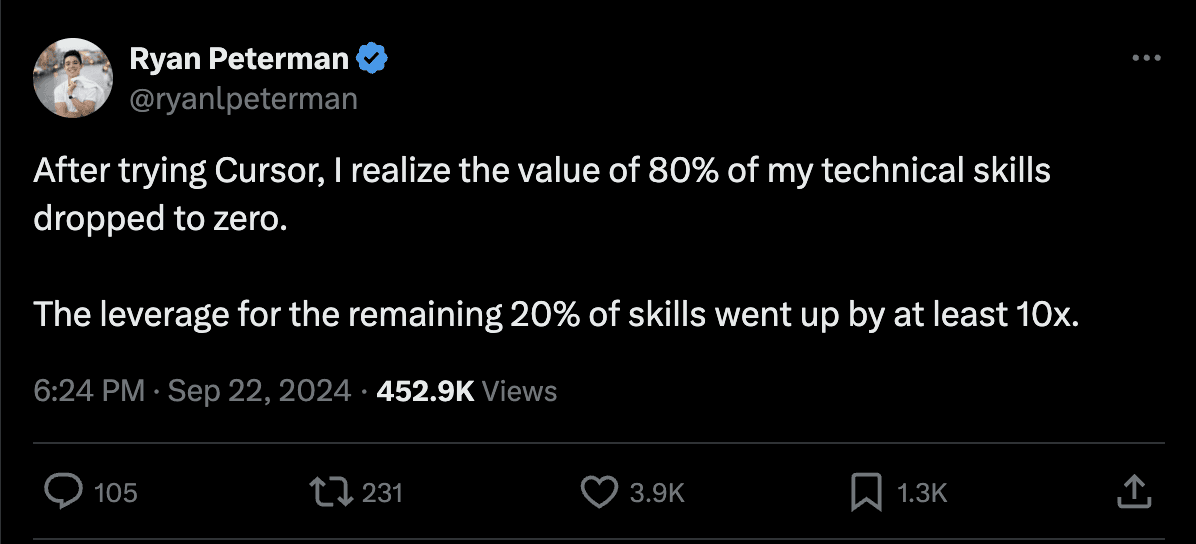
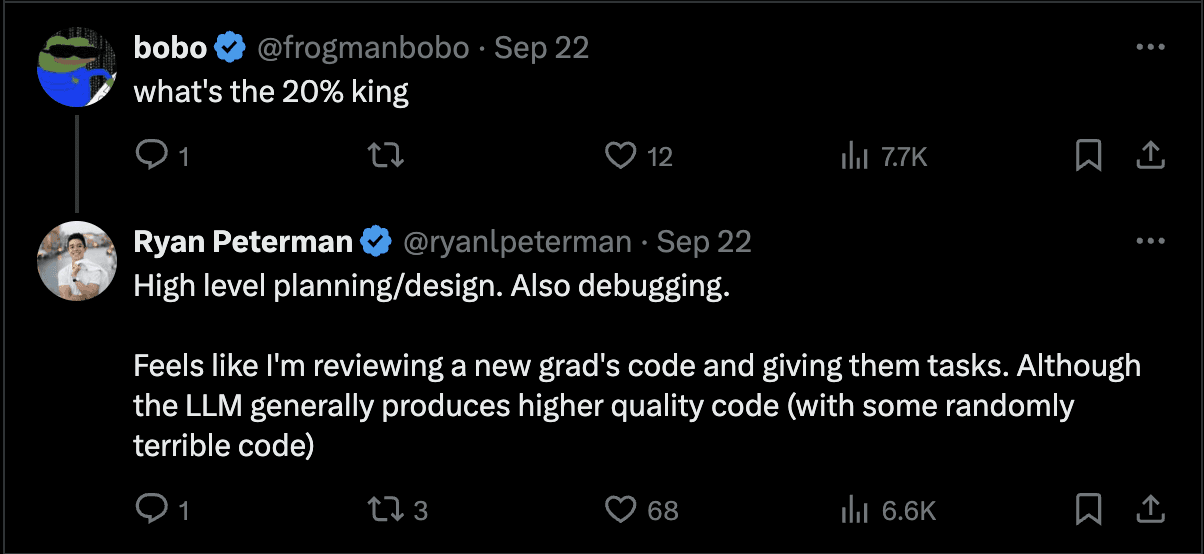
I don’t say this to scare you. I say this because it’s the truth. We live in a world governed by “superlinear returns,” which means the rich tend to get richer, and many end up with nothing. I'll let Paul Graham expound on this idea:
“Teachers and coaches implicitly told us the returns were linear. ‘You get out,’ I heard a thousand times, ‘what you put in.’ They meant well, but this is rarely true. If your product is only half as good as your competitor's, you don't get half as many customers. You get no customers, and you go out of business.”
If you’re only half as good a programmer as others, you won’t get half the salary, you may get no salary. AI is simply increasing the minimum threshold for the skillset required in this field.
So what can you do?
I would point you to the same 4 rules above that Newport suggests. Read the book, get great at deep work, and everything else will fall into place.
Cultivate Team Deep Work
We’ve talked about deep work on a very individualistic level, but the reality is that most of us work in teams.
This is problematic because your team culture and schedule may create an atmosphere unfriendly to deep work.
I'm swamped with constant meetings. When I'm not in meetings, I'm getting pinged in Slack every 5 minutes. I'm put on tight deadlines but I feel like I'm given very little time to actually code.
Sound familiar?
This is why we built CodeClimbers, an open-source platform to help your team create and protect deep work time. It does this in several ways:
Our AI analyzes your team’s calendar and work history to predict deep work hours for the week. It then offers warnings and suggestions when potential deep work is below what it should be.
Analytics allow you to track how much deep work your and your team are getting and allows you to compare this data across your organization and industry.
Deep Work Mode empowers you and your devs to create a distraction-free environment. In one click, it blocks out for deep work the calendar, changes Slack statuses to busy, and activates autoresponder messages that notify colleagues of deep work.
Team time blocking lets you schedule deep work sessions for the entire team. These are great for creating a team culture where deep work is prioritized.
If you’re interested in using CodeClimbers at your company, get started here.
If you made it to the end of this, it probably means you're pretty good at deep work. Cheers!
Sources
Newport, Cal. Deep Work: Rules for Focused Success in a Distracted World. Grand Central Publishing, 2016.
Federal Reserve Bank of St. Louis. “Working Paper 2024-027.” Federal Reserve Bank of St. Louis Research, https://research.stlouisfed.org/wp/more/2024-027.
Peterman, Ryan. X, 2024, https://x.com/ryanlpeterman/status/1837981443051724956. Accessed 26 September 2024.
Graham, Paul. “Superlinear Returns.” Paul Graham, October 2023, https://www.paulgraham.com/superlinear.html. Accessed 26 September 2024.
